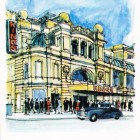Orfeo ed Euridice 1967Sadler's Wells Opera
Read more about the opera Orpheus and Euridice
Gluck's Orpheus opera had not previously featured in the repertoire at Sadler's Wells, and this production did not stay long. However it is worth noting for several reasons. The most obvious of these is that the company tried out a great rarity, the revised version Gluck made for Paris, as Orphée et Eurydice, where the part of Orpheus is transposed down to be sung by a high tenor. The French fondness for ballet within operatic performances was already well-established, and the dance element is far more prominent here than in the simpler Viennese version.
The movement on this occasion was provided through choreography by Peter Darrell and the company of which he was director, Western Theatre Ballet. Two years later this company, changing its name to Scottish Theatre Ballet, would become a ready-made national dance company relocating to Glasgow, and is now known as Scottish Ballet. Darrell would himself return to the work a dozen years later, choreographing Peter Ebert's staging with Janet Baker at Scottish Opera. The cast list includes dancers who became familiar figures in Scotland for many years, most notably Elaine McDonald.
As for the singers, Alexander Young was known as an expert performer of Handel and Mozart, and the pure, flowing lines of Gluck suited him well. Patricia Kern is unusual casting as Euridice - the normal expectation would have been for her to sing Orpheus in the usual mezzo version. Margaret Curphey's range eventually included the heavy Verdi roles as well as Brünnhilde and Isolde, but this is a very early appearance - the voice had an attractive lyrical quality. As it happens, the Glasgow Herald of 26 October reveals that Patricia Kern did not sing on opening night, the role being taken very well, at short notice, by Josephine Barstow.
Sadler's Wells Opera's Glasgow Season - 1967
Sadler's Wells Opera only came to Glasgow in October 1967, but the four week stay was an unusually long one. They gave three performances of a brand new production of The Magic Flute, four of the familiar 1960 Barber of Seville, three of Orpheus in the Underworld (also from 1960) and three of a vintage Samson and Delilah, a staging from the early 'fifties receiving a brief revival. The Cenerentola from 1959 returned for a final visit. Gluck's Orpheus and Euridice was seen in the unfamiliar version for tenor, Ernani had a rather controversial staging on its only tour, and Malcolm Williamson's Violins of Saint Jacques proved to be a genuinely popular new work.
The performance schedule was as follows:
Week 1, w/c Monday, 23 October: Mon 23 Magic Flute; Tue 24 Barber of Seville; Wed 25 Orpheus and Euridice; Thu 26 np; Fri 27 Orpheus and Euridice; Sat 28 Magic Flute.
Week 2, w/c Monday, 30 October: Mon 30 np; Tue 31 Samson and Delilah; Wed 1 Nov Barber of Seville; Thu 2 Magic Flute; Fri 3 Orpheus and Euridice; Sat 4 Samson and Delilah.
Week 3, w/c Monday, 6 November: Mon 6 np; Tue 7 Violins of Saint-Jacques; Wed 8 Ernani; Thu 9 m Barber of Seville; Thu 9 e Cenerentola; Fri 10 Orpheus in the Underworld; Sat 11 Ernani.
Week 4, w/c Monday 13 November: Mon 13 Cenerentola; Tue 14 Samson and Delilah; Wed 15 Orpheus in the Underworld; Thu 16 Barber of Seville; Fri 17 Violins of Saint-Jacques; Sat 18 Orpheus in the Underworld.
Cast details come from the opening night review in the Glasgow Herald and a copy of the programme for 3 November in the OperaScotland collection.
Performance Cast
- Orfeo
- Amor
-
Margaret Neville (Oct 25)
Phyllis Glavin (Nov 3)
- Euridice
-
Josephine Barstow (Oct 25)
Patricia Kern (Nov 3)
- Blessed Spirit
